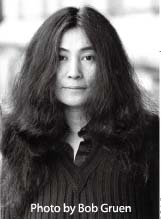Tokyo Journal’s Exclusive Interview with Yoko Ono on the 33rd Anniversary of John Lennon’s Death
Interview by Anthony Al-Jamie
WHY is Yoko Ono amazing, you ask? What is not amazing about her would be a better question! Not only is she the most famous Japanese person in the world, she has been breaking new ground in art, peace activism, and music for six decades. Now, 81-years old, Yoko is producing one chart-topper after another, with 11 #1 dance singles, all while traveling the world promoting peace. Performing with her band, the Plastic Ono Band which includes the exceptionally talented Sean Lennon (son of John Lennon and Yoko Ono), Yoko has captured the interest of a new generation not emotionally vested in The Beatles and free of prejudice.
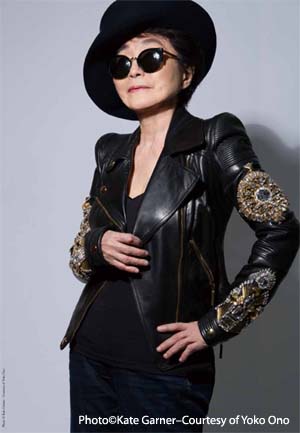 Yoko’s love for music and art began long before she met John Lennon. She grew up studying piano and composition and learning to sing classical opera and German lieder at the prestigious Jiyu-gakuen Music school in Japan. The great granddaughter of Yasuda bank’s founder Zenijiro Yasuda, Yoko came from an elite family and was the first woman ever admitted to the philosophy program at the prestigious Gakushuin University, where she was a classmate of the Crown Prince (the present Emperor of Japan). Yoko moved to New York and enrolled in the prestigious Sarah Lawrence College in 1952.
Yoko’s love for music and art began long before she met John Lennon. She grew up studying piano and composition and learning to sing classical opera and German lieder at the prestigious Jiyu-gakuen Music school in Japan. The great granddaughter of Yasuda bank’s founder Zenijiro Yasuda, Yoko came from an elite family and was the first woman ever admitted to the philosophy program at the prestigious Gakushuin University, where she was a classmate of the Crown Prince (the present Emperor of Japan). Yoko moved to New York and enrolled in the prestigious Sarah Lawrence College in 1952.
She went through two brief marriages: first to Toshi Ichiyanagi and later to Anthony Cox (who fathered her daughter Kyoko). During this period her artwork attracted the attention of leading members of New York’s avant-garde artistic community through her involvement with such artists as John Cage, Merce Cunningham, Ornette Coleman and Andy Warhol. In 1966 Yoko Ono met her third husband to be - John Lennon - when he visited a preview of her exhibition at the Indica Gallery in London, England. It was at this time that her life changed from that of avant-garde artist, highly respected by her peers and the artistic community, to household name whose art was picked apart by a public not ready for her radical approach.
I was fortunate enough to interview Yoko Ono on December 8th, 2013, the 33rd anniversary of John Lennon’s death. She was in Tokyo for the December 7th “Dream Power John Lennon Super Live Concert” at the legendary Budokan.
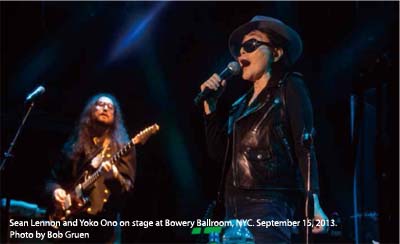 TJ: Tell us about your new video “Bad Dancer”. How did that come about?
TJ: Tell us about your new video “Bad Dancer”. How did that come about?
ONO: Well, I needed a video from my album. Whenever I played that one, people just started moving their butts.
TJ: Who choreographed it?
ONO: Well, there’s no choreography, is there? We just brought in people. That was Ben [Dickinson]’s idea; he said, “Is it ok?” and I said, “ok.”
TJ: Tell me about your new album “Take Me to the Land of Hell”. Is there a deep message behind it?
ONO: The message? The message is good music. If I could give you some pleasure, enjoyment and knowledge, I’ll be very happy.
TJ: How was yesterday’s concert at Budokan?
ONO: It was good. It’s all to do with the exchange of power and the exchange of love. If we keep doing that, one day we’ll have a beautiful world.
TJ: You’ve always been concerned about war.
ONO: Yes, it’s such a silly thing to do. It’s not a way to solve anything. If you want to solve [problems] with war, then you become poorer and poorer, because it’s a very expensive game.
TJ: Yes it is, and you experienced war as a child in Tokyo during the WWII bombings of Tokyo, right?
ONO: Yes, I was in Tokyo and then I went to Nagano prefecture. Many families died, you know. Well, first of all, my father was in French Indochina, which was the name for Vietnam at the time and my mother was in Tokyo. She was looking after the house and whatever else. The three kids - me, my younger sister and my younger brother - were evacuated to the country and it was not easy.
TJ: So, do you think that difficult experience of the war made a strong impression on you and did that stimulate you to want to help bring about peace?
ONO: Well, I think at the time I thought that was just life. That was the only life I knew. Life was a pretty frightening thing, but also an exciting thing and I was right in the middle of that. Afterwards, when I think about it, wow! That experience was good.
TJ: Was it a difficult time in Japan for you?
ONO: Yes, it was very difficult. Well, not for me necessarily, but Japan changed altogether.
TJ: I understand you were a classmate of the Emperor at Gakushuin University. Is that correct?
ONO: Yeah, yeah. It’s true.
TJ: Did you meet him?
ONO: Yes, of course, we met.
TJ: What was he like?
ONO: He’s an incredibly, incredibly sensitive person, who really understands what he is in the world and what he has to do. He’s a very responsible person.
TJ: Did you ever ask him about his father or hear him speak about his father? I guess not, huh?
ONO: No, of course not – “What’s your dad like?” (laughs) Yeah, right.
TJ: Have you had a chance to meet with the Emperor in recent years?
ONO: Recent years? No.
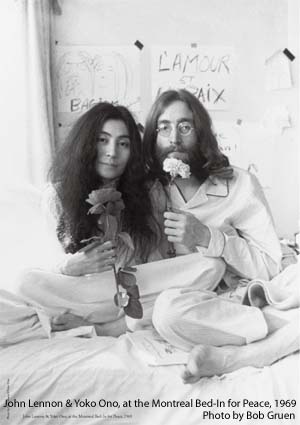 TJ: Let me ask you about John a little bit. Did you ever teach John to speak any Japanese?
TJ: Let me ask you about John a little bit. Did you ever teach John to speak any Japanese?
ONO: Well, he started to pick up some Japanese words and such when he was in Japan. He was a quick learner so he just kept enjoying learning things that have to do with Japan and Japanese language and all that. For example, there is a book called “Ai”. Ai is “I” in English, but in Japan Ai means love, which was very interesting to him.
TJ: Was John into Japanese music at all?
ONO: All Asian music – especially Indian music was something both of us felt very strongly about but Japanese music isn’t that interesting.
TJ: Was he into Japanese food?
ONO: He was totally into Japanese food.
TJ: Do you remember what his favorite was?
ONO:It was soba in the beginning. He said, “Look, you’re not going to make me eat sashimi and sushi.” Well, I didn’t ask you to, you know! And then he started to like it so much. We used to go to sushi restaurants all the time.
TJ: Why do you think John was so much into peace?
ONO: Well, when he was born a German plane was flying right over the hospital! As a person, he experienced war in that sense.
TJ: Today is December 8th. John passed away 33 years ago today.
ONO: I know.
TJ: What is it about John’s character that you loved the most?
ONO: John is a very, very lovable person. I think a touch of Liverpool doesn’t hurt. Liverpool people really have some kind of a sense of humor. A left-handed sense of humor, shall we say? And he definitely had it!
TJ: I’ve read many interviews and it’s obvious he respected you more than anything in the world.
ONO: Well, I don’t know about that but anyway, he had some feelings for me.
TJ: That must have made you happy. What is it about you that you think he respected the most?
ONO: I have no idea because I’m a woman. I’m joking - ha ha. Well, I don’t know. How would I know? You’re asking the wrong person.
TJ: Many people say you are misunderstood. Do you feel you have been misunderstood throughout your life?
ONO: Yes, definitely. But misunderstanding is something we all experience. Your mother probably doesn’t understand you so well and you’re angry about that or something. Even in the public, we don’t really understand each other. Well, we try not to understand each other to keep our independence, or something. So people misunderstood about me. It’s really a noble thing in a way, probably. I was a Japanese and the English and the Americans just had a war with us you know, so what do you think?
TJ: Do you think it was a combination of being a strong, capable Japanese woman with an American platform to speak on that made you seem very complex and unique?
ONO: Well, I don’t know. I was just me. If that means strong, maybe I am. But I don’t think I’m that strong. I’m just normal in that sense, but the fact that I survived and lived so long might suggest that I was stronger than I thought I was maybe. But it’s just a fluke that I’m alive.
TJ: Are you a healthy eater? Do you eat Japanese food?
ONO: I eat anything, or at least, I love all different kinds of food. I love Indian. I love Thai. I love Vietnamese food. I love Japanese food. I love Chinese food, Korean food. Well, that’s all Asian, but I love French, and I absolutely love German food.
TJ: Can you cook at all?
ONO: I used to. But I feel I’ve done my share and I just don’t want to do it now.
TJ: Could John cook?
ONO: John was trying. He laughed a lot about it. “I baked this bread like an hour ago and it’s all gone now because everybody ate it. It’s not like having a medal, is it?”
TJ: Well, let me get back to what’s important here. What do you think has been the biggest obstacle that has prevented the world from achieving peace?
ONO: Well, I don’t know. Everything is an achievement. I guess the fact that we are talking now and the fact that we are alive is in fact an achievement. And we should not think of achievement as something we will have one day. We’re having it now. We are living now.
TJ; What is it that makes you so committed to leading this movement in helping people live better lives and peaceful lives?
ONO: Well, I’m not leading anything. I’m just being here, now.
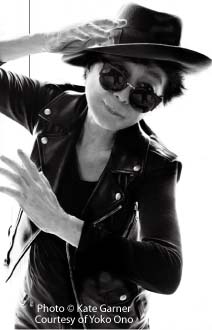 TJ: How do you think we can learn to be more peaceful in the future?
TJ: How do you think we can learn to be more peaceful in the future?
ONO: Did you notice that the world is getting more peaceful? I’m not talking about the incredible announcement about wars and big notices we are given, but in daily life everyone is using the computer and their iPod or something and when [you] have 2 or 3 people in a room, especially my son and my son’s friends, they are just doing the computer. We’re silent people now. I think we’re going to get to world peace faster than we think by just being silent. Everybody is silent and nobody is angry at each other or anything. tj
My time to speak with Yoko was brief and thus to gain further insight I called on my fellow Tokyo Journal columnist: legendary rock photographer, Bob Gruen. Gruen served as John and Yoko’s personal photographer and has known Yoko for over forty years.
Rock Photographer Bob Gruen on John and Yoko
TJ: Bob, can you give us an example of Yoko Ono’s art and how people reacted to it?
GRUEN: Once, a friend was talking about destruction art and how upset she was that an artist had destroyed a piano. She always wanted to play but couldn’t afford one, and couldn’t understand why the artist destroyed it. Yoko said, “That’s exactly the way you’re supposed to feel. They destroyed it to show you how horrible it is to destroy something.” Yoko was once in a destructive art show but couldn’t afford a piano or anything to destroy. Although Yoko was from a very wealthy family, they didn’t like her being an artist, so they cut her off, and she was actually very poor living in the lower east side of New York. So she played the telephone game, where you whisper something to somebody and they whisper it to the next person and so on. This was a room with about 500 people. Finally the last person had the message and was coming up to Yoko to tell her and the whole audience was waiting to hear how it got translated. Yoko put her hand up and said, “Stop. I don’t want to hear it.” And what she destroyed was communication. The audience had all participated in this and were all pissed off ! Yoko said, if half the audience doesn’t get up and leave, she hasn’t done it right. What I like about her art is it’s not just something to look at but something to feel.
TJ: Why is she so misunderstood?
GRUEN:That’s always been a mystery to me because anyone who has met Yoko has tremendous admiration for her and it’s mostly the people who never met her who think they don’t like her. I think in some ways she’s been misunderstood because her artwork is so strong. Some of her art relates to difficult feelings of pain and loneliness and loss, and people don’t like to be in touch with their feelings. So rather than realize that Yoko is really good at what she does because she made them feel that, people often say, “Yoko’s terrible. She made me feel bad.” But people who are aware that we live with these feelings constantly have great admiration for the way she is able to express and share them. It’s not something to be afraid of: to hide and not ever feel. Because when you hide your feelings, you end up hiding your happiness because you numb yourself to all your feelings, not just bad feelings.
TJ: Do you think she has difficulty communicating well with the public?
GRUEN: Yeah, it seems that there is a little gap between the way she talks and what she is trying to say. Often, she is very clear, actually. It’s just that people aren’t listening.
TJ: Didn’t John Lennon describe her as the world’s most famous unknown artist?
GRUEN: Yeah... everybody knows who she is but nobody knows what she does. But nowadays she’s gotten a huge following because she’s done so many shows. In England the last few years, she’s been releasing remixes of her music. Every single song went to #1! I saw her playing South by Southwest in front of a thousand people at 1:30 in the morning. Yoko played an hour and a half show and they were cheering and yelling for more. This was at 79 years old! She was just rocking out with this new, incredible, powerful music and sound that was kind of a cross between Ornette Coleman and Miles Davis. Being friends with Yoko it made my heart warm seeing her go from the early seventies where crowds would boo her, to the point where these kids were screaming for encores.
TJ: Artists often become well known or more respected after they pass away. Do you think Yoko will be like that?
GRUEN: Oh, yeah. You know, she was a little... uuhh... a little? She was WAY ahead of her time. There is a lot of humor in her work. You actually have to see the work to understand. I think since this younger generation is really understanding and appreciating more and more about what she does, that as time goes on she’ll be one of the great artists of her time.
 TJ: So when did you first meet John and Yoko?
TJ: So when did you first meet John and Yoko?
GRUEN: Through an interview with Elephant’s Memory, the band that was backing them up. I asked if I could come to the studio to get a picture of them with the Elephants and Yoko said they would pose for one at the end of the night. She said, “Watch out for Phil Spector! He doesn’t like photographers!” It was kind of a trial by fire. I avoided Phil all night and at the end they posed for a photo. Later they called me because I had the only picture of them with the band and they wanted to use it on the album cover. I went over to show them the pictures and it was the first time we really talked and we got along really well. We had the same cynical kind of sense of humor and at the end of the afternoon Yoko said she wanted me to stay in touch and come back and work whenever I could. I’m still in touch with her today, and that was 42 years ago!
TJ: Did you go to Japan with them?
GRUEN: Well I went with Yoko. It was when John and Yoko were separated and John was in L.A. They were involved in a couple of lawsuits and didn’t have access to their money, so Yoko went and did a tour in Japan to pay some bills. Going along really opened my eyes about Yoko because I had only experienced her in the States and the English press, which was very brutal to Yoko. In Japan, they welcomed her like a national hero. I had seen Yoko perform before, like at the John Lennon concert at Madison Square Garden, and people either really didn’t like it or didn’t understand it. When it was her audience, they liked it. She played Kenny’s Castaways and that was a really good show. She used her voice as an instrument to express all kinds of emotions, rather than comparing her to a singer, because Yoko is obviously not Barbara Streisand but uses her voice in a much more unique way. She’s much more like Ornette Coleman than a female singer. I learned watching the audience react in Japan that they really understood and appreciated the emotions she was putting out. I’ve been a fan of her ever since.
TJ: I read that during the time John and Yoko were separated, he had a UFO sighting. Can you tell us about it?
GRUEN: Yeah, he called me. It was always exciting when John would leave a message. He wouldn’t say John Lennon called. He would say, “Dr. Winston” and so whenever I got a message from Dr. Winston, it was like, “Oh my God. John called!” I called back and he said he had seen a flying saucer and that May [Pang] had taken pictures and he wanted me to develop the film. He was very excited about it.
TJ: Was he high or drunk?
GRUEN: No. He had spent a year getting loaded in L.A. and he was coming back to New York basically to clean up. He was sober as could be, and he was very clear about what he saw. He had been sitting in the living room. The door to the patio was a little bit open and he saw...like a reflection, like lights blinking. At first he thought it was a store or something and then he realized he’s on [the top floor] and there are no stores up there, so he opened the door and it was a flying saucer, just kind of floating past his apartment. He went out on the balcony and he starts screaming, “There’s a flying saucer! There’s a flying saucer!” He was naked at the time. May came running out with the camera and took a bunch of photos. I had given her a special kind of film that works really well in the dark a high-speed film that was actually developed for army surveillance. They gave me the film to develop. I actually put a roll of my film in the tank, then his film, then another roll of mine on top. My two rolls came out perfectly and his roll came out completely blank, you know, like sci-fi blank.... May had shot some pictures earlier in the studio with John and Ringo and they were blank too; the whole roll was. But my film came out perfect. It was kind of like the Twilight Zone, you know... So I called the police. I said, “Did anyone report a flying saucer last night?” He said, “What, up on the east side? Yeah, we got a couple of calls.” The Daily News said the same. The New York Times hung up on me (laughs). I asked, “Did anyone see a flying saucer?” They went CLICK. He put it on the album, “I saw a flying saucer.” and he believed it. I mean, he and May never took any drugs or anything and they both saw the same thing. He said it was so normal. It was bizarre because it was just like you’d imagine in a movie: a big saucer floating past his building and... I never saw a flying saucer but he did!
TJ: How did your famous photo of John wearing a New York t-shirt come about?
GRUEN: John called me to take some pictures for his “Walls and Bridges” album cover, and we did a series of close-ups of his face on the roof of his apartment. Then I suggested we take more pictures around the roof for publicity and we had a whole background of the skyline of New York. I had actually given him the New York t-shirt a year earlier because I used to wear those kinds of t-shirts all the time and sometimes I’d give them to friends. It wasn’t even sold in a store. It was made by some guy in Brooklyn or somewhere and he used to sell them on the street in Times Square, and whenever I saw him I’d buy a few. I said, “You still got that New York shirt?” He knew right where it was, which impressed me because a lot of people gave him a lot of things, but he went and put the shirt on and we took that photo. That was in 1974, actually about two weeks after I was in Japan with Yoko, and three days later my son was born! It was a very exciting month for me. (laughs)
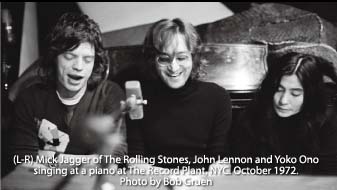 TJ: What is your favorite memory of being with John and Yoko?
TJ: What is your favorite memory of being with John and Yoko?
GRUEN: I have several. The day they invited me to photograph their newborn Sean when he was about a month old to show their family. John and Yoko were so happy, particularly John you can see in the pictures that he was absolutely ecstatic. It was really nice to see him recovering and having a second chance at life. He very much regretted that he wasn’t able to be in touch with Julian as Julian was born while John was a Beatle but he was determined to have a relationship with Sean. Another highlight was being a few feet away while John and Yoko played piano and John sang “Imagine” at Madison Square Garden. (laughs) But I think another was going out to Broadway to the dance [performance] of Merce Cunningham, a friend of Yoko’s from the downtown avant-garde art scene. That was very exciting sitting at the table with James Taylor and Carly Simon, and Yoko introducing Merce to James and Carly.
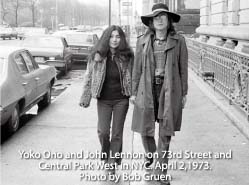 TJ: What were John and Yoko like as a couple?
TJ: What were John and Yoko like as a couple?
GRUEN: They were always touching each other, putting their arm around each other, sitting next to each other. They would share the same seat. In the studio, they were like a tag team, producing songs and giving opinions on the music. They were a very loving couple. It was fun to be with them. They were very much aware and interested in what was going on around them on many levels. They were very normal. They just liked to be together, to eat well, to relax in a comfortable place. They may be celebrities but they weren’t not people, you know? I think that’s one thing people love about John and Yoko they were always so open and admitted who they were and what their feelings were. They shared that through art and their interviews. John and Yoko didn’t want people to look up to them as idols. Yoko said sometimes she doesn’t really believe in people having statues to John Lennon or John and Yoko because people should believe in themselves, and not idolize John and Yoko any more than themselves because we are all human and we all have good parts and bad parts.
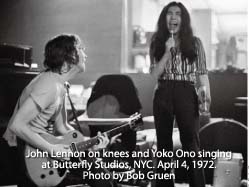 TJ: From your perspective what was it that John loved about Yoko so much?
TJ: From your perspective what was it that John loved about Yoko so much?
GRUEN: Yoko has incredible perception and awareness of the moment (the present) and the ramifications of things going forward in the future. In a lot of her pictures she appears very serious. She once said in Japan it’s a tradition not to smile in photographs, that you take life seriously, but in fact Yoko smiles often and you couldn’t live with John Lennon without having a sense of humor. Yoko can be a very sexy person. She’s very open and free. There are a lot of reasons why John or anyone could like Yoko. Most people who meet her walk out and go, “Oh my God. I just met the most amazing person.”
TJ: So she has a good sense of humor?
GRUEN: Yep. On TV an interviewer once asked her how tall she was and she said, “I’m very tall.” And he said, “Well...what do you mean?” She said, “Well when I look down at the ground, it’s far away.” They were very much aware and interested
TJ: How would you describe John’s personality?
GRUEN: John was always cracking jokes. He was very grounded, very perceptive. So he would really expose people for who they were, and the things he said were very blunt and almost insulting sometimes, but he would twist it with a pun and make it fun.
TJ: What would you say John’s weaknesses were?
GRUEN: Did he have any? He was very vulnerable. He was a bad drunk but he got over that. He took too much of whatever was available and then reacted like a crazy kid but he got over that.
TJ: How bad was his drug addiction?
GRUEN: John was pretty open about his experimentation and drug use and so on. The point is not the mistakes of his use but the fact that he overcame it. After the wildly excessive time they call “The Lost Weekend” that lasted 18 months, he sobered up. With Yoko’s guidance, John was able to take care of his son, learn about the responsibilities of being a parent, eat a much healthier diet, and just basically grow up.
[Before that] They got involved with a lot of radicals. John was playing with Elephant’s Memory and there was quite a bit of drinking and carrying on, and after the concert John got very depressed. The reviews were bad. The government was harassing him. There was a lawsuit with his manager and his reaction was to get drunk. Yoko didn’t want to do that and she basically told him to leave. He didn’t run away with his secretary the way people sometimes assume. Yoko actually asked May Pang to take care of him; a very hard job. She did it very well, but John was always in touch with Yoko. Almost every day he asked her if he could come back and she would say, “No, you’re not ready.” It wasn’t until he was called out in the international press that he finally came back to New York, and about 6 months later she finally let him come back home, I mean let him come back into her life, which she did immediately after she accepted him. Pretty soon she became pregnant and when the baby was born, John spent most of the next five years raising him. That’s when he wrote the Double Fantasy album. It’s not the typical rock and roll kind of songs he did when he was getting drunk with the boys “I’m just a lonely teenager and I need some love” kind-of-songs. It’s a very mature album discussing the adult kind of issues that a couple get into.
TJ: What inspired John to record again after being away from the music scene for so many years?
GRUEN: He heard The B-52’s in Bermuda and realized they were making the same vocal sounds that Yoko was but were popular for it. In fact, The B-52’s were big fans of Yoko’s and used to play her records and imitate her and that’s where they got their vocal style from. So John came back with songs he had written with plans to record not a John Lennon album but an album with Yoko. When the first part of the album came out, Yoko’s music got very good reviews for the first time: finally there was a new generation who didn’t care who broke up the Beatles but were actually listening to her, and they liked it. John wanted to exploit this before even finishing the second half of the album. He wanted to start a world tour that would carry his message of adult maturity and responsibility. Unfortunately the only place you can find the message now is in the Playboy and Andy Peebles BBC interviews the two best interviews he gave in the weeks before he died and it’s too bad for the world that he didn’t get to go on that tour because those ideas were very popular in the eighties controlling your drug intake, being responsible for your family, being more careful about your diet. John I think was ahead of his time but not with something totally unusual. The ideas were already growing, but he had a unique way of expressing them that people could understand, and I think that was the greatest loss the insight that he was going to bring around the world.
TJ: I heard you were actually supposed to meet John the night he passed away?
GRUEN: Yeah. They had put out their “Double Fantasy” album and were fixing up an album that came out later called “Milk and Honey”. John and I had sat all night a couple of days before, talking about things. He was really happy because of Yoko’s good reviews, and critics were calling his songs more MOR (for Middle of the Road) and he said, “That’s ok. I’m going down the middle of the road to the bank.” Because his album was jumping up the charts. Yoko had written “Walking on Thin Ice”, which actually became a big dance hit for her, and they’d almost finished it the night that John passed away. So, when [John and I] were [last] talking John said he was going to take a couple of weeks off for Christmas, finish mixing the album, get the band together and start rehearsing in February, make some videos to promote it, and by the end of March we were going to go on the world tour. We were talking about where to go shopping and eat in Japan and Paris. I went home that night so excited. I was going to meet the leaders of world! He was excited about going back to England for the first time in many years. On Monday night I was supposed to go show some photos to John and Yoko and then make it down to the Village Voice, but as usual I was late. Then my doorman buzzed me. He said, “Do you have a radio or TV on?” I said, “No, why?” and he said, “I just heard that John Lennon was shot.” Then my phone started ringing like crazy. I remember a friend called up and he had just heard on the TV that John was dead. That was the most permanent thing I ever heard. I think dead is the most obscene four-letter word in the English language. It’s just too permanent. Because the first thing I thought of is how to change it, how to fix it, how to make it better, and there’s just no way you can. I realized this was a worldwide event, that so many people would be affected. It was my job to put out the good pictures so that John always looked good in the newspapers. I remember literally crawling across the floor to the file cabinets because when I heard he was dead, I kind of slid down to the floor. I was talking to Yoko a few days later. She said something about when you are in a battle and the leader with the flag goes down, you gotta pick that flag up and keep going. I don’t think one person can replace John but a lot of people have taken up the cause. I’m very lucky that I knew him and worked with him so much. I get to talk about him and I carry his message of peace and love, and that’s a great message to carry around the world.
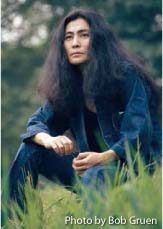 TJ: So, let’s get back to Yoko. How would you describe her personality?
TJ: So, let’s get back to Yoko. How would you describe her personality?
GRUEN: When people ask me what kind of woman Yoko is, I always say she is the kind of woman that John Lennon would marry, and he certainly had his choice. Yoko is an extremely active woman. She doesn’t really sleep eight hours at a time. She takes catnaps for an hour or two at most. She’s on a 24-hour schedule. She travels around the world. She’s got her own art and all kinds of other projects exhibitions of her new art as well as retrospectives of her old work. She puts on John and Yoko art shows around the world, and there’s a lot of different peace activities. She writes letters. She recently wrote one to the fishermen [in Japan] to stop the dolphin hunt, and she gets involved in a lot of causes like that.
TJ: She’s very strong!
GRUEN: She’s a very strong woman: very powerful, very direct. She’s not shy. Well, she says she’s shy. In public she is but she’s not shy about expressing her opinions.
TJ: Is she a good friend?
GRUEN: Yeah. She’s very generous, very considerate, very caring...and very quick! You know, if I send her an e-mail, it doesn’t take days or weeks...like, I get an answer back in five minutes. She’s right on top of everything all the time and very helpful to all her friends.
TJ: Does she have a lot of people around her taking care of her all the time?
GRUEN: Well, she’s got staff, but I wouldn’t say a lot. She’s got a small staff that’s very efficient. She’s a great mother to Sean. She brought him up to be comfortable with who he is and to understand the difference between fame and who you really are. He’s very grounded. He put together a great band for her. They do a lot of shows together. On her birthday last year she did a show for about an hour and danced for about an hour and a half; when I left she was still dancing! (laughs). She’s got more energy than anyone I know. I don’t think I’ve ever seen her tired!
TJ: Obviously she’s very intelligent.
GRUEN: Very, very intelligent. She’s been around the block a few times. She has a lot of experience. It’s hard to pull the wool over her eyes but she’s a person. She’s human.
TJ: She does a lot of charity work. What is her main cause?
GRUEN: Peace, world peace; that’s the main focus of just about everything she does.
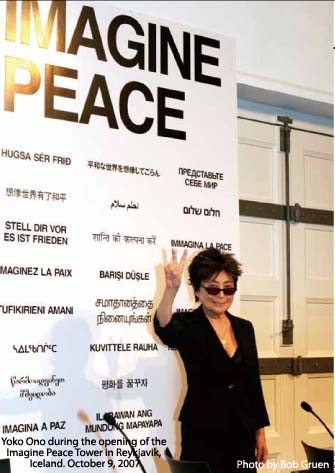 TJ: What makes Yoko special?
TJ: What makes Yoko special?
GRUEN: Ask her millions of fans. It’s not one thing. It’s her generosity, her openness, her perception and the fact she is grounded in the present. It’s hard to define. It’s her care for mankind, the work she does for a better world and a better future for all of us. She’s very selfless. To get attacked for it constantly is a mystery. It’s amazing that so many people put her down. They think her music is weird. When John and Yoko got together, I think there was a lot of racism involved with England against the Japanese and against John for picking a weird avantgarde artist instead of a beautiful blond model like a rock star is supposed to. But John really found a mate that he could communicate with, somebody who inspired him and encouraged him to go beyond his comfort zone and he loved that. He totally admired Yoko. That last night we talked, he said, “Always listen to Yoko. She’s always right. She always knows what to do.” And I find that to be true. tj
The original article can be found in Issue #274 of the Tokyo Journal. Click here to order from Amazon.






